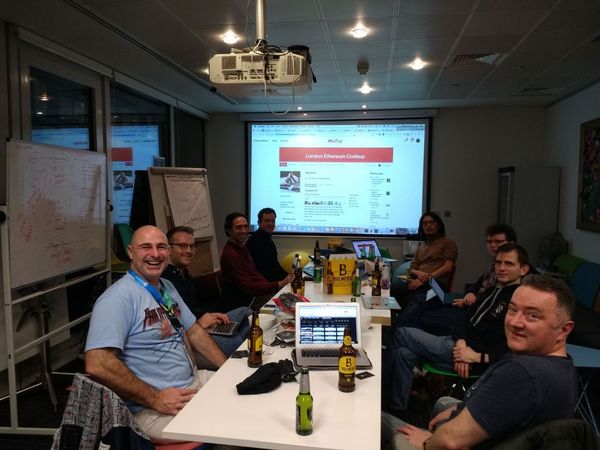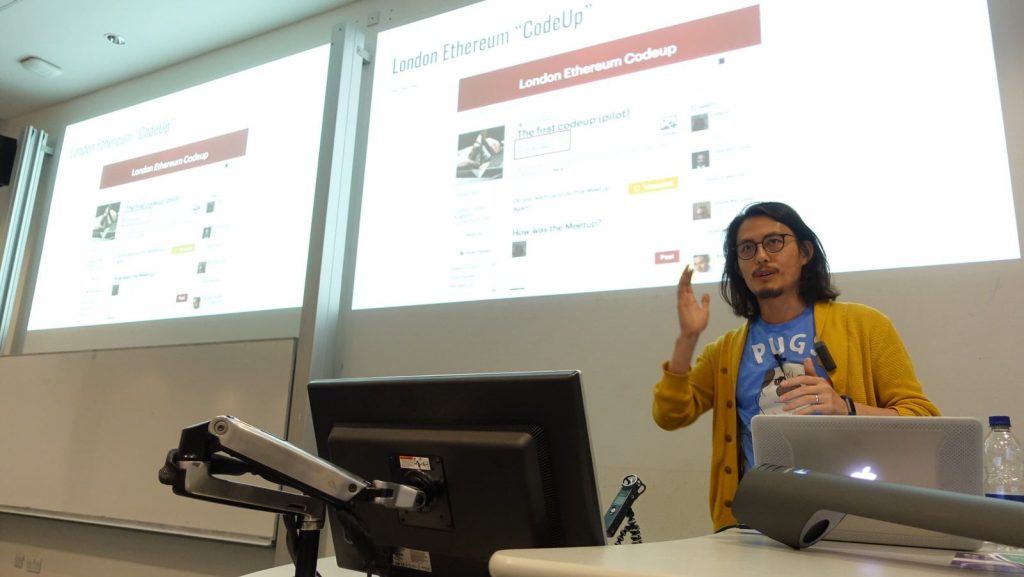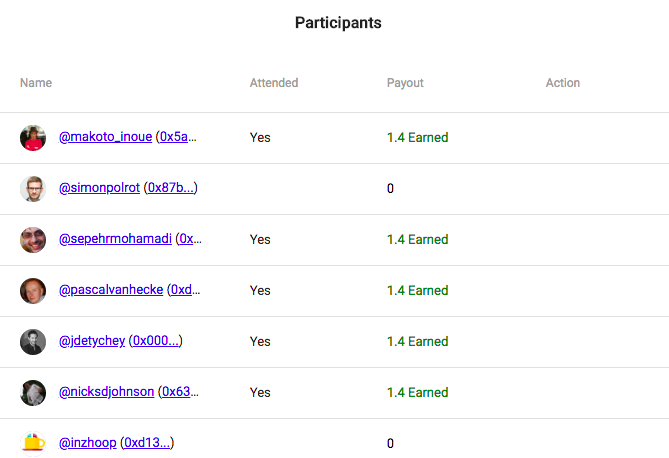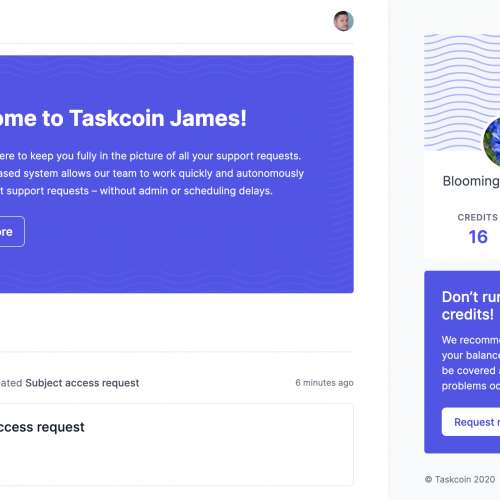Makoto Inoue is lead developer at B2B insurance provider, SimplyBusiness, and creator of BlockParty, a dApp that helps solve the problem of unpredictable Meetup attendance rates using the Ethereum blockchain. Makoto has previously founded two startups and worked for investment bank Merrill Lynch.

We spoke to Makoto to find out how he got into the blockchain world, how he came to create the BlockParty dApp and advice for those developing with blockchain technology.
Here’s what he had to say…
Background
Born and raised in Japan, Makoto is the son of a programmer and has always been used to having computers around him. Makoto first came to the UK in 1996 to do an exchange study in Computer Science at The University of Manchester. “That’s where I did my first brief bit of programming, after I graduated in 1998 I moved back to Tokyo and started working for investment bank Merrill Lynch, now Bank of America” he said.
A pivot into blockchain technology
It wasn’t until Makoto started working for SimplyBusiness in 2015, a B2B insurance company based in London, that he first heard about blockchain and distributed ledger technology.
“About two years ago, the company’s CEO sent an internal email with the title ‘distributed ledger technology is getting hot’. That was at a time when the government had also published a paper on how blockchain could change everything, so I read it and ended up going straight down the blockchain rabbit hole” he said.

Keen to learn more, Makoto started a Meetup study group so that he could learn Ethereum coding with other like minded people.
“When we setup the Meetup group I encouraged people to donate because at the time I was doing a charity challenge for Whizz-kid, a charity that help disabled children by providing them with vital equipment, support and life skills.” Makoto continues to raise money for this cause to this day.
I think the lack of female inclusion in the crypto and blockchain industry is a serious issue and I am very proud of her initiative
Makoto also organised #breaktheblock hackathon where insurance professionals and blockchain developers team up to solve insurance problems. Unlike other closed competitions, all the results are open and sourced on Github, so that anyone can take the project forward. One of the participating teams, headed by Lukasz Musial, still continue their project, then called called re-x now renamed to Qilin. They took their project forward by entering other blockchain competitions and Lukasz was recently selected as a finalist at Blockchain Competition 2017.
Makoto told us how one of the participants was so inspired at the hackathon that she started “Women in Blockchain Meetup” hackathon. “I think the lack of female inclusion in the crypto and blockchain industry is a serious issue and I am very proud of her initiative” he said.
Founding BlockParty
Makoto first thought about the idea of using a deposit mechanism to incentivise people to attend Meetup groups when working on his online video learning startup.
“Many people signed up to online courses but didn’t complete them, so I had this idea of taking a deposit and only giving it back to users if they completed a course.”

It wasn’t till SimplyBusiness, the company he works for now, held their own internal hackathon that a work colleague said that he should look at solving the problem of attendance rates at Meetups using blockchain technology.
BlockParty works by providing a simple incentive for people to only register for events if they intend to go. Users pay small deposit (in Ether) when they register for the event and lose the deposit if they don’t turn up. Attendees get their deposit back and then split the deposits from no-shows. Attendees can end up making a small profit by actually going to the event!
Makoto worked on the dApp in the SimplyBusiness internal hackathon for two days and decided to test it out at a Devcon2 event in Shanghai. Makoto hosted a meetup in a Chinese restaurant to test out the BlockParty dApp and “people from all over the world came and I had 100% attendance, so I was really excited to see it being used.”
Real life use & challenges
The second time Makoto tested the dApp was in March 2017 at a developer conference. This time it didn’t work out like in Shanghai. “I hosted it as an event, ten people signed up but two people show up so that time myself and the other attendees got a 0.4 Ether back. So I was lucky this time.”

Makoto told us how the value of the deposit is one of the variables you can choose to change in the smart contract. Given that the price of Ether fluctuates this was an important mechanism to keep the price reflective of the price of Ether.
Makoto chatted about some of the challenges he faced when deploying BlockParty into a real life setting. “The deposit became a big issue as the price of Ether increased due to demand. For example, when I hosted one Meetup I selected one Ether as a deposit. At the next one I then cut it down to 0.05 Ether but as the price continued to rise the price of one Ether was close to £200-400 so it got very expensive” he said.
Makoto also had trouble with network congestion which meant transactions ended up taking too long. “I did it right in the middle of a network pileup, so when people registered the night before the transaction did not get through until the day after” he said.
Advice and tips for working with blockchain technologies
Makoto offered advice for those looking to start developing with Ethereum. Makoto recommends the Truffle framework, a popular development framework for Ethereum, as a good place to start.
As long as you can control the risk of the stake in your contract I still think it’s ok to deploy on the mainnet
Makoto also chatted about the use of hackathons as good place to learn. “Status organised a hackathon last year and I won a small prize. I recommend just to go to hackathons and do whatever topic you’re interested in” he said.
Makoto believes that companies ought to be deploying more on the main network rather than test nets. However he warned about the dangers of having too much money at stake when deploying on the main network. “In BlockParty’s case, the stake is not a lot.
Makoto believes by controlling the risk of your stake in a contract you can protect the risk of your money and participants money when deploying on the main net. “That’s what I’m trying to mostly be concerned about as I found lots of bugs in the smart contracts. As long as you can control the risk of the stake in your contract I still think it’s ok to deploy on the mainnet” he said.
The future of blockchain technologies
Makoto talked about the current contradictory nature of blockchain technologies. “One of the contradicting parts of blockchain technologies is that you should be spending, but because the prices are going up so rapidly, people are becoming hesitant to spend… for example, when I deployed a contract last year it was £1.00, but when I tried to do it three weeks ago there was network congestion it cost me £80.00.”
Despite these problems, Makoto is excited about the future of blockchain and the projects and technologies looking to solve scalability and interoperability. “I’m very excited about anything that will help solve the issue of congestion, the price of deploying contracts, and integration between tokens and coins” he said.
We’d like to say a big thanks to Makoto for chatting to us. You can find out more about the BlockParty dApp and see the full repo on Github. Follow Makoto on Twitter and if you want to learn alongside other people developing in Ethereum you can join the London Codeup Meetup.
If you’d like to chat about your tech project, get in touch with Simpleweb today.
If you’d like to discuss your startup or project, get in touch with Simpleweb today.



